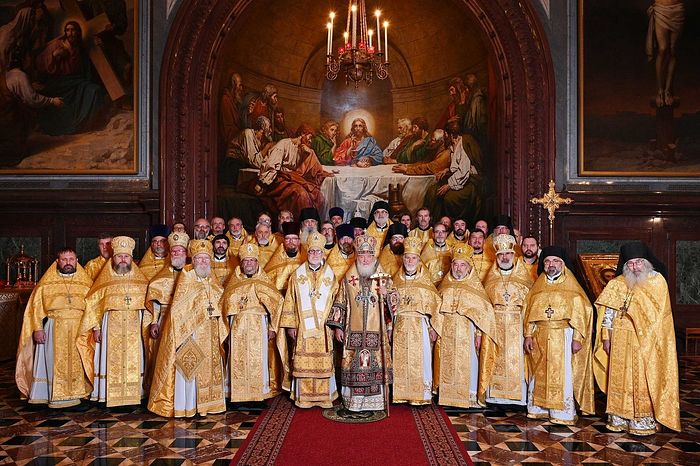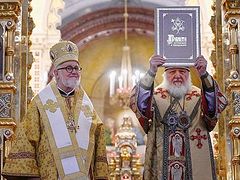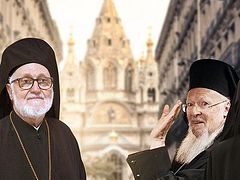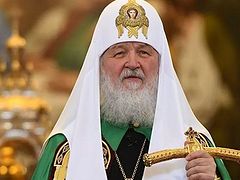Moscow, November 8, 2019
 Pat. Kirill with Met. John of Dubna and the delegation from the Archdiocese on Sunday, when the gramota of reunification was officially granted. Photo: patriarchia.ru
Pat. Kirill with Met. John of Dubna and the delegation from the Archdiocese on Sunday, when the gramota of reunification was officially granted. Photo: patriarchia.ru
One of the major arguments of the parishioners of the Archdiocese of Russian Churches of Western Europe in favor of reuniting with the Moscow Patriarchate was the Patriarchate of Constantinople’s actions in Ukraine, where it created and granted autocephaly to a group of schismatics, explained Protodeacon John Drobot-Tikhonitsky of the St. Alexander Nevsky Cathedral in Paris.
His comments came during the recent visit of the Archdiocesan delegation to Moscow, during which the gramota of reunion was formally granted to Archbishop John of Dubna, the hierarch of the Archdiocese. Abp. John was also elevated to the dignity of Metropolitan during the same service at Christ the Savior Cathedral on Sunday.
“For many parishioners, it wasn’t just that the Patriarchate of Constantinople abolished the Archdiocese that became an important argument for reuniting with the Moscow Patriarchate. People did not like what Constantinople did in Ukraine,” Protodeacon John explained, reports RIA-Novosti.
Met. John also emphasized that he was greatly disturbed by what Constantinople was doing in Ukraine, even before the Patriarchate made the surprise move of revoking the Archdiocese’s status as an exarchate.
“What happened in Ukraine shocked the entire Orthodox Church, not just the Russian Church. I had the opportunity to communicate with representatives of other Orthodox Churches, and I saw that everyone is greatly grieving,” he said on Monday at a meeting with journalists in Moscow, reports Interfax-Religion.
“I very deeply regret that conciliarity did not work,” he said, adding that “actions that ignore the will of God’s people are often condemned by history.”
According to Protodeacon John, the decision to join the Moscow Patriarchate is not made by the rector of each parish alone, but by a vote of the registered lay members, “and the majority favored reunification with the Russian Church.”
As Archpriest Andrei Drobot, the rector of the three parishes in the Archdiocese, noted, some parishioners stopped communing in the churches of the Archdiocese, when it was still under Constantinople, when they learned about what Constantinople had done in Ukraine.
“Several parishioners simply left our parishes when Constantinople began ‘to do its business’ in Ukraine: They didn’t come to commune, although there was no other church near them. It’s just a principled stand from the people,” said Fr. Andrei.
At least two entire parishes even left the Archdiocese and joined the Russian Orthodox Church Outside of Russia due to Constantinople’s lawlessness in Ukraine.
But the main reason why most people agreed to reunite with the Moscow Patriarchate was its respect for the traditions of the Archdiocese. “The main argument is that we were accepted as we are, with our status, respecting our history, without change, peacefully and with open arms, which is very comforting and encouraging,” Fr. Andrei concluded.
Meanwhile, those parishes that did not reunite with the Russian Church did so mainly for political reasons, Protodeacon John said.
“Most of those who took it negatively did so for political reasons. It was said that the Moscow Patriarchate is Putin’s Church, and therefore it is impossible to go there—very primitive political grounds. There are those who believe that Russia is still the Bolsheviks, the Soviet Union, and ‘nothing to mess with.’ These are mostly descendants of the first emigration, but they are very few. There are also extreme liberals, the ‘neo-Renovationists’: They have a liberal approach to Church discipline, fasting, to the traditional foundations of the Russian Orthodox Church. And there are even some individuals who support Constantinople and what it does in Ukraine,” he explained.
According to Protodeacon John, no more than 15% of the Archdiocese’s parishioners opposed reunification with the Moscow Patriarchate. There are also those priests who have remained with Constantinople, joining the local Greek metropoles, and some have joined the Romanian Patriarchate.
For them, “the main thing is—not Moscow,” Protodeacon John explained. “But we are talking with these people as well,” he added.



